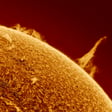
The Best Evidence Yet for Ancient Life on Mars with Dr. Steven Benner
In a landmark announcement, NASA revealed that the Perseverance rover has discovered a potential biosignature in a rock sample named “Sapphire Canyon” from Cheyava Falls, in the Bright Angel formation in Jezero Crater—collected in July 2024. The sample’s sedimentary rocks, rich in organic carbon, sulfur, oxidized iron, and phosphorus, along with newly identified “leopard spots” made of vivianite and greigite, suggest chemical environments that on Earth preserve microbial life. The finding—reported in Nature—marks perhaps the closest we’ve yet come to finding evidence of ancient life on Mars. Dr. Steven Benner joins John to discuss this finding in detail.
NASA Says Mars Rover Discovered Potential Biosignature Last Year
https://www.nasa.gov/news-release/nasa-says-mars-rover-discovered-potential-biosignature-last-year/
https://www.nature.com/articles/s41586-025-09413-0
Dr. Steven Benner links:
https://primordialscoop.org/
https://www.ffame.org/
YouTube Membership: https://www.youtube.com/channel/UCz3qvETKooktNgCvvheuQDw/join
Podcast: hhttps://creators.spotify.com/pod/show/john-michael-godier/subscribe
Apple: https://apple.co/3CS7rjT
More JMG
https://www.youtube.com/c/JohnMichaelGodier
Want to support the channel?
Patreon: https://www.patreon.com/EventHorizonShow
Follow us at other places!
@JMGEventHorizon
Music:
https://stellardrone.bandcamp.com/
https://migueljohnson.bandcamp.com/
https://leerosevere.bandcamp.com/
https://aeriumambient.bandcamp.com/
FOOTAGE:
NASA
ESA/Hubble
ESO - M.Kornmesser
ESO - L.Calcada
ESO - Jose Francisco Salgado (josefrancisco.org)
NAOJ
University of Warwick
Goddard Visualization Studio
Langley Research Center
Pixabay






